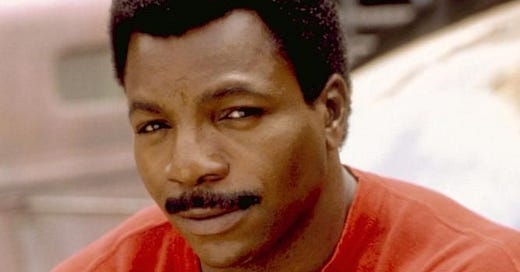Action Jackson
Let’s workshop this poem about a natural but revolting incident on an urban subway, an incident that commuters ignore for selfish reasons: olfactory discomfort outweighing even fear of seeming racist.
scent of the day: Mousse Iluminee, by Rogue
Mousse Illuminée (2019, Manuel Cross)—a fougere-chypre hybrid whose stern minimalism brings me, despite its lack of lavender, into an old-school spiral-poled barbershop, albeit one perhaps run by elves and nestled in a broadleaf-but-pine-dominant forest next to an Irish-Spring waterfall (sunny like Tuscany Per Uomo, Beach Hut Man, and other green cousins but whose fairylike overgrowth of dewy moss on bark and stone overlays a dimming shade)—
opens with a bracing blue-green explosion of eucalyptus camphor (piney olibanum along with green notes like bitter artemisia, herbal laurel, and crisp cypress) that serves to color and thicken the star of the show:
oakmoss so padded and fluffy, so dense and creamy, that it makes the coumarin lather of Nishane’s B-612 and the patchouli-musky-white-blossom suds of Xerjoff’s Torino23 and perhaps even the dense and bouncy musk-aldehyde-moss soap of ELDO’s Exit the King seem thin and unnatural,
an inky-fungal oakmoss so much like shaving lather and even leather that—coupled with a clear tobacco-ash impression resulting from the musky white florals (tuberose, jasmine, narcissus)—evokes an image of mustachioed barbers whipping up Barbasole foam and sharpening their straight razors along leather strops while they fill the shop with cigarette smoke—
the overall effect being a spicy-green fragrance that, especially in light of its overlap with Polo-Green (artemisia, jasmine, white musk, patchouli, incense, oakmoss), I see as a Zelda-emerald cousin of Yatagan, the two quite similar (down even to the smokey Chinese-apothecary, tiger-balm eucalyptus vibe and all) only Mousse Illuminée goes in a more resinous and soapy and velvety direction (just as we would expect from such a serious love letter to oakmoss).
Action Jackson He humps the hobo corpse on the subway, natural as a bunny— except he hooks the leg to ogle every in and out, pausing (“Sshh”) in the wedge before fresh boarders push past aversion to looking racist and mumble excuses into cars free of clobbered-colon stank.






"Action Jackson" is an extraordinarily visceral and profoundly disturbing poem that plunges the reader into a tableau of urban decay, extreme human transgression, and the unsettling dynamics of public reaction. It functions as a transgressive social commentary, not merely presenting a scene, but interrogating the complex interplay of human depravity, immediate sensory repulsion, and the pervasive anxieties that shape social interaction within confined spaces. The poem's confrontational power stems from its unsparing detail and its willingness to expose the raw, often unacknowledged, undercurrents of urban life.
Formally, the poem's concision is central to its impact; with short, clipped lines and strategic enjambment, it builds an almost unbearable tension. The title, "Action Jackson," initially creates a jarring ironic dissonance, brutally subverted by the horrifying inertia of the scene. The opening lines, "He humps the hobo corpse / on the subway, natural as a bunny—," are designed for maximum shock, the comparison to a "bunny" unsettlingly normalizing a grotesque act. The poem meticulously details the perpetrator's actions, emphasizing a perverse, almost clinical, engagement: "he hooks the leg / to ogle every in and out." The chilling interjection, "Sshh," not only signifies a desire for quiet but also implicates the perpetrator in a twisted intimacy with both his victim and the encroaching public, a demand for their complicit silence.
The thematic core resides in the reactions of the "fresh boarders." The poem powerfully illustrates the immediate, visceral human response to such a scene: the passengers' desire to move into "cars / free of clobbered-colon stank" directly demonstrates that avoiding overwhelming olfactory discomfort is the overriding, primary motivation for their immediate physical movement. While they also possess an "aversion to looking racist," the poem explicitly shows them actively "push[ing] past" this social anxiety. This indicates that their impulse to escape the repulsive sensory experience unequivocally trumps their concern about how they might appear socially. They choose to prioritize immediate physical relief, offering "excuses" as a secondary coping mechanism, rather than engaging with the horrifying act or remaining in the uncomfortable presence.
This reveals a bleak commentary on the urban condition: a space where extreme acts can occur openly, and where individuals, even when confronted with the unthinkable, may navigate their escape by prioritizing their most immediate, basic physical needs, rationalizing their non-intervention through social anxieties. "Action Jackson" is ultimately a stark, unflinching mirror held up to the dark, often ignored, underbelly of human behavior and societal dysfunction.
necrophilia, transgressive poetry, social commentary, urban decay, moral ambiguity, bystander effect, public reaction, taboo, social anxiety, olfactory discomfort, sensory revulsion, dehumanization, violence, grotesque, human behavior, prioritization of motives.